 Petzlover
Petzlover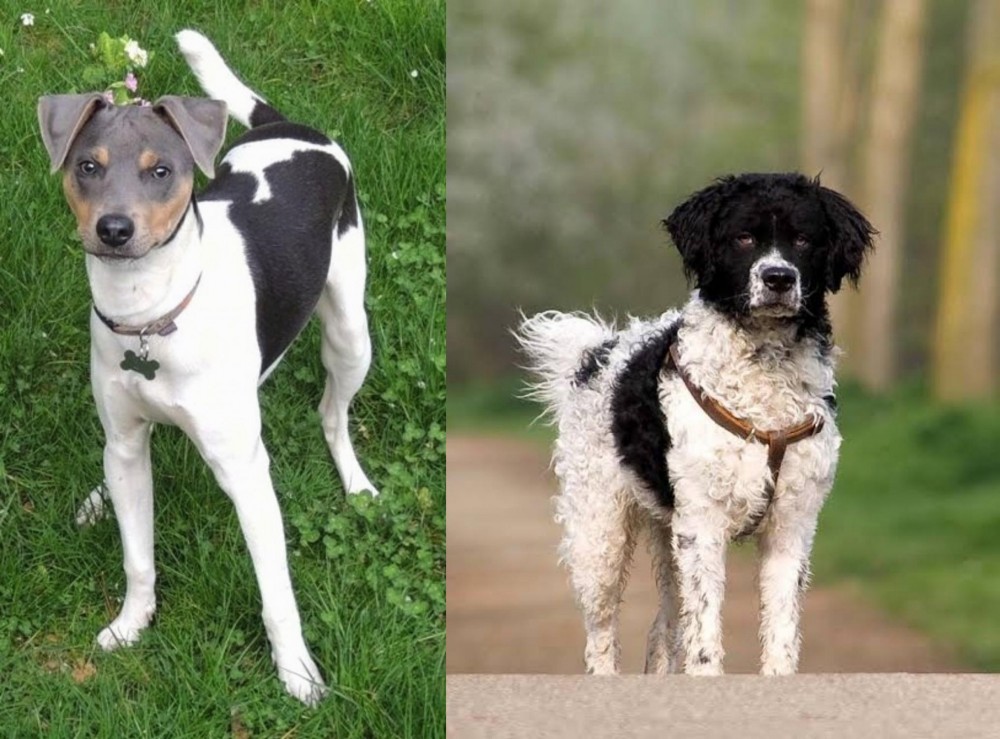 Brazilian Terrier is originated from Brazil but Wetterhoun is originated from Netherlands. Brazilian Terrier may grow 19 cm / 7 inches shorter than Wetterhoun. Brazilian Terrier may weigh 25 kg / 55 pounds lesser than Wetterhoun. Both Brazilian Terrier and Wetterhoun has same life span. Both Brazilian Terrier and Wetterhoun has almost same litter size. Brazilian Terrier requires Low Maintenance. But Wetterhoun requires Moderate Maintenance
Brazilian Terrier is originated from Brazil but Wetterhoun is originated from Netherlands. Brazilian Terrier may grow 19 cm / 7 inches shorter than Wetterhoun. Brazilian Terrier may weigh 25 kg / 55 pounds lesser than Wetterhoun. Both Brazilian Terrier and Wetterhoun has same life span. Both Brazilian Terrier and Wetterhoun has almost same litter size. Brazilian Terrier requires Low Maintenance. But Wetterhoun requires Moderate Maintenance
 Though its exact origins are questioned it is known that the Brazillian Terrier was developed in Brazil and along with the Fila Brasileiro, are the only authentic Brazillian breeds. In the early 1800’s the Jack Russel Terrier, Fox Terrier, Chihuahuas and Miniature Pinschers were mixed to create the Brazillian Terrier. The Terrier breed was brought to Brazil by Europeans and there were probably both the Jack Russel and the Fox Terrier in the mix. Very popular within its own country the Brazillian Terrier is barely known outside Brazil. They were registered in 1973 even though they have been around in Brazil since the 1800’s. They are both single and pack hunting dogs. They chase and surround prey until the prey becomes too exhausted to run or fight. The Brazillian Terrier is larger than any European or North American Terrier. They are also less aggressive than other terrier types so that pack hunting became possible. They were built to work in the heat for long periods of time. Their stamina far surpassed other terriers as did their resistance to parasites and diseases.
Though its exact origins are questioned it is known that the Brazillian Terrier was developed in Brazil and along with the Fila Brasileiro, are the only authentic Brazillian breeds. In the early 1800’s the Jack Russel Terrier, Fox Terrier, Chihuahuas and Miniature Pinschers were mixed to create the Brazillian Terrier. The Terrier breed was brought to Brazil by Europeans and there were probably both the Jack Russel and the Fox Terrier in the mix. Very popular within its own country the Brazillian Terrier is barely known outside Brazil. They were registered in 1973 even though they have been around in Brazil since the 1800’s. They are both single and pack hunting dogs. They chase and surround prey until the prey becomes too exhausted to run or fight. The Brazillian Terrier is larger than any European or North American Terrier. They are also less aggressive than other terrier types so that pack hunting became possible. They were built to work in the heat for long periods of time. Their stamina far surpassed other terriers as did their resistance to parasites and diseases.
Many farmers and plantation owners came to values them for their ability to hunt down and eliminate vermin on the land and thus help with increased production of livestock and crops. They were so loved by the farmers and plantation owners that they began known as the “dog of the common people”. Yet it was not only the rural folks who valued this breed, but the people of the cities did as well. Because they were good ratters, a reasonable size, affectionate and loyal, many urban households sported a Brazillian Terrier. The breed spread throughout the country.
The Brazillian Terrier was kept mostly pure bred throughout its history but due to lack of pedigrees and paperwork it was not recognized by any kennel club unit 1973 when Brazillian breeders formed the Clube de Fox Paulistinha or CPF. They had a standard developed and created a stud book. By 1991 they were still not officially recognized but the CFP and the CBKC (Confederacio Brasilera de Cinofilia) began the process of establishing acceptable pedigrees and recognition of the breed. The FCI recognized the breed in 2007.
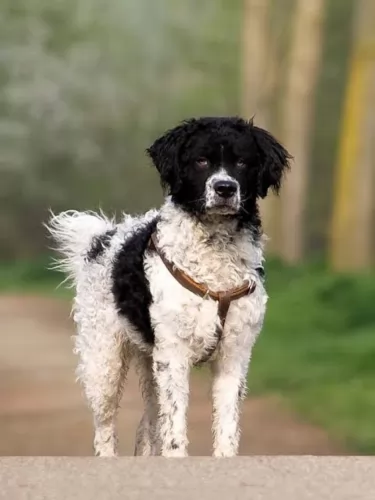 The Wetterhoun is a water dog developed in the 1500 or 1600s to hunt otters. The breed was developed by the Frisians in the Netherlands near the Northwest corner. In addition to catching otters in the lakes near by, they were also used as gundogs to hunt game. They are a fearless, tough and loyal working dog. They love the water and they are build for it with a waterproof coat and tight tail that is spiraled. They will swim happily in freezing cold weather as well.
The Wetterhoun is a water dog developed in the 1500 or 1600s to hunt otters. The breed was developed by the Frisians in the Netherlands near the Northwest corner. In addition to catching otters in the lakes near by, they were also used as gundogs to hunt game. They are a fearless, tough and loyal working dog. They love the water and they are build for it with a waterproof coat and tight tail that is spiraled. They will swim happily in freezing cold weather as well.
The Wetterhoun is rare and not seen outside of the Netherlands. Descendent of the Water Dog, that is now extinct, he is probably a relative of many spaniel types that also call the Water Dog their ancestor. Yet the Wetterhoun is not a spaniel or spaniel type.
The breed almost disappeared during World War II, like many others, they brought back and are now becoming more and more popular. The breed is only recognized by the Federation Cynologique Internationale and the United Kennel Club. AKC does not recognize them, but there are many hunting clubs and other registries that do. They are often promoted as one of the rare breeds.
 The Brazillian Terrier is a small to medium sized dog with a white – tricolor (tan and black) coat. It has a narrow chest, a triangular rather flat skull, the tail is docked, folded, half pricked hears, and the body is well-balanced. Its legs are long and athletic, and the coat is very short and very fine. He has round eyes that can be green, blue, brown or gray. They are very much like the Jack Russel in temperament. His expression should reflect that temperament in its eagerness and alertness.
The Brazillian Terrier is a small to medium sized dog with a white – tricolor (tan and black) coat. It has a narrow chest, a triangular rather flat skull, the tail is docked, folded, half pricked hears, and the body is well-balanced. Its legs are long and athletic, and the coat is very short and very fine. He has round eyes that can be green, blue, brown or gray. They are very much like the Jack Russel in temperament. His expression should reflect that temperament in its eagerness and alertness.
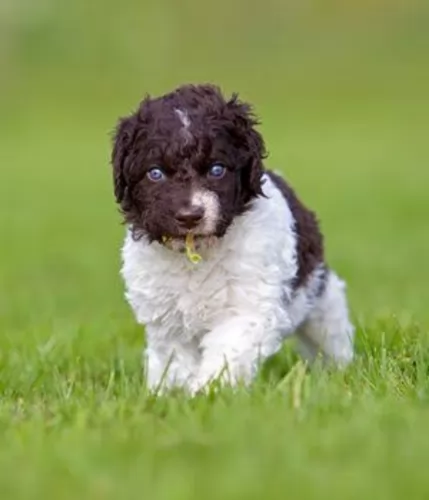 The Wetterhoun is a compact, medium sized breed weighing about 55 to 77 pounds. Great water dogs they are athletically built with low set ears hanging next to their heads, a waterproof coat, distinctive eyes with a very serious expression and a tightly curled tail held aloft over the back. Their coat is waterproof, somewhat oily, curly and thick. The fur is of a smoother texture on the ears, head, and legs. They can be solid black, solid brown, brown with white, or black with white.
The Wetterhoun is a compact, medium sized breed weighing about 55 to 77 pounds. Great water dogs they are athletically built with low set ears hanging next to their heads, a waterproof coat, distinctive eyes with a very serious expression and a tightly curled tail held aloft over the back. Their coat is waterproof, somewhat oily, curly and thick. The fur is of a smoother texture on the ears, head, and legs. They can be solid black, solid brown, brown with white, or black with white.
 The Brazillian Terrier is very much like his ancestor the Jack Russell. Like the JR Terrier he is friendly, intelligent, alert, playful, and loves to dig. They are courageous and fearless. They will obey but only if they know and believe you are really in charge. Otherwise they are intelligent enough to be very independent, determined and willful. At the same time, they are utterly loyal to their people. He needs a lot of toys but don’t let him live with other small animals. His hunting instincts may be the strongest of all terriers and he may harm small animals in the home. You have to teach him when to stop barking. Their love of play would consume your entire day if you let them. You should understand the terrier personality before you acquire a Brazillian Terrier.
The Brazillian Terrier is very much like his ancestor the Jack Russell. Like the JR Terrier he is friendly, intelligent, alert, playful, and loves to dig. They are courageous and fearless. They will obey but only if they know and believe you are really in charge. Otherwise they are intelligent enough to be very independent, determined and willful. At the same time, they are utterly loyal to their people. He needs a lot of toys but don’t let him live with other small animals. His hunting instincts may be the strongest of all terriers and he may harm small animals in the home. You have to teach him when to stop barking. Their love of play would consume your entire day if you let them. You should understand the terrier personality before you acquire a Brazillian Terrier.
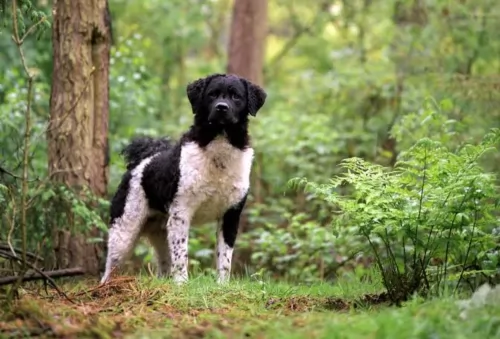 3.Adaptability – not a great apartment dog even though he is not that big. They need space. They need a job and they will finish their job at their own pace no matter what you say. It is impossible to train this trait out of them.
3.Adaptability – not a great apartment dog even though he is not that big. They need space. They need a job and they will finish their job at their own pace no matter what you say. It is impossible to train this trait out of them.
4.Learning ability Very high learning ability, very eager to learn and very smart. He is stubborn about finishing whatever job he is working on
 The breed is mostly healthy except for hunting accidents and a few generic issues they are susceptible to. This includes things like Dental and eye issues, the usual ear issues, liver issues, allergies, epilepsy and patellar luxation. However, they are more likely to have issues related to hunting than another of these predisposed conditions
The breed is mostly healthy except for hunting accidents and a few generic issues they are susceptible to. This includes things like Dental and eye issues, the usual ear issues, liver issues, allergies, epilepsy and patellar luxation. However, they are more likely to have issues related to hunting than another of these predisposed conditions
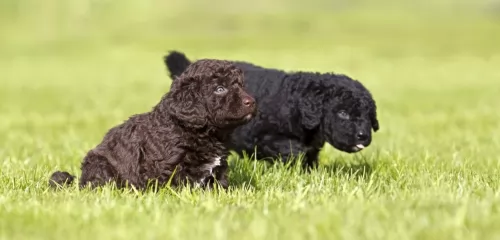 A hardy and healthy breed they do not have severe health issues. But like every his
A hardy and healthy breed they do not have severe health issues. But like every his
• Ear Infections – like any breed with hanging ears they can be prone to infection. This is particularly true because the dogs are in the water a lot. Be sure to clean and dry them after every water episode and inspect them on a regular basis even if the dog has not been in the water.
• Patellar Luxation – Knee cap issue with movement and inflammation. Can cause lameness and arthritis.
 This is still a working dog and a terrier at that. They are high energy, athletic dogs. Feed a high-quality food at the rate of 1 to 2 cups per day, split into 2 meals. Treat are good for training but if your Brazillian Terrier is not hunting or working in some way, stay away from too much food and treats as he can easily become obese.
This is still a working dog and a terrier at that. They are high energy, athletic dogs. Feed a high-quality food at the rate of 1 to 2 cups per day, split into 2 meals. Treat are good for training but if your Brazillian Terrier is not hunting or working in some way, stay away from too much food and treats as he can easily become obese.
As mentioned previously, the biggest concern with this breed is hunting accidents or injuries. Look out for ear and skin infections or allergies. For the most part this is a hardy, healthy breed.
A very energetic dog, the Brazillian Terrier like its ancestors has a need to work off that energy. Yes, he is an urban dog and can live in an apartment, but you better have a dog park or a competition or some place to hunt because his need for exercise cannot be answered by daily walks and running around an apartment. IF your Brazillian Terrier is not stimulated physically and mentally on a daily basis he will become destructive, hyperactive and very, very unhappy. Don’t just stick him in a yard and leave him either as terriers are known to dig and escape and he will too.
They excel at agility, flyball, obedience and confirmation. They love to chase things and they love to explore. Barn Hunt would also be a good game for them. They are very smart, so their physical exercise should be paired with mental stimulation.
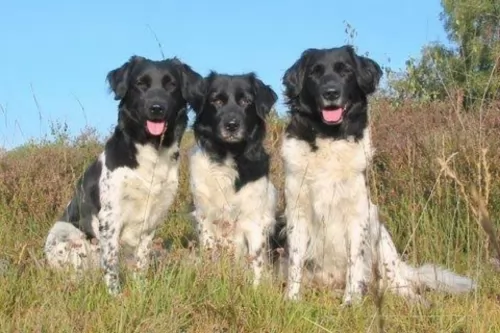 1Feeding the puppy -This is an active, hunting and swimming breed. They need good nutrition and high quality puppy food. A food formulated for active breeds or hunting dogs would be best. Feed your puppy in smaller amounts 3-4 times per day.
1Feeding the puppy -This is an active, hunting and swimming breed. They need good nutrition and high quality puppy food. A food formulated for active breeds or hunting dogs would be best. Feed your puppy in smaller amounts 3-4 times per day.
2.Feeding the adult - This is an active, hunting and swimming breed. They need good nutrition and high quality adult food. A food formulated for active breeds or hunting dogs would be best. Feed your adult twice per day.
4. Games and Exercises – This is an active working dog that needs a lot of exercise every day. A 30 minute walk is only the beginning. They need outdoor time to play and run. They need to swim if at all possible.